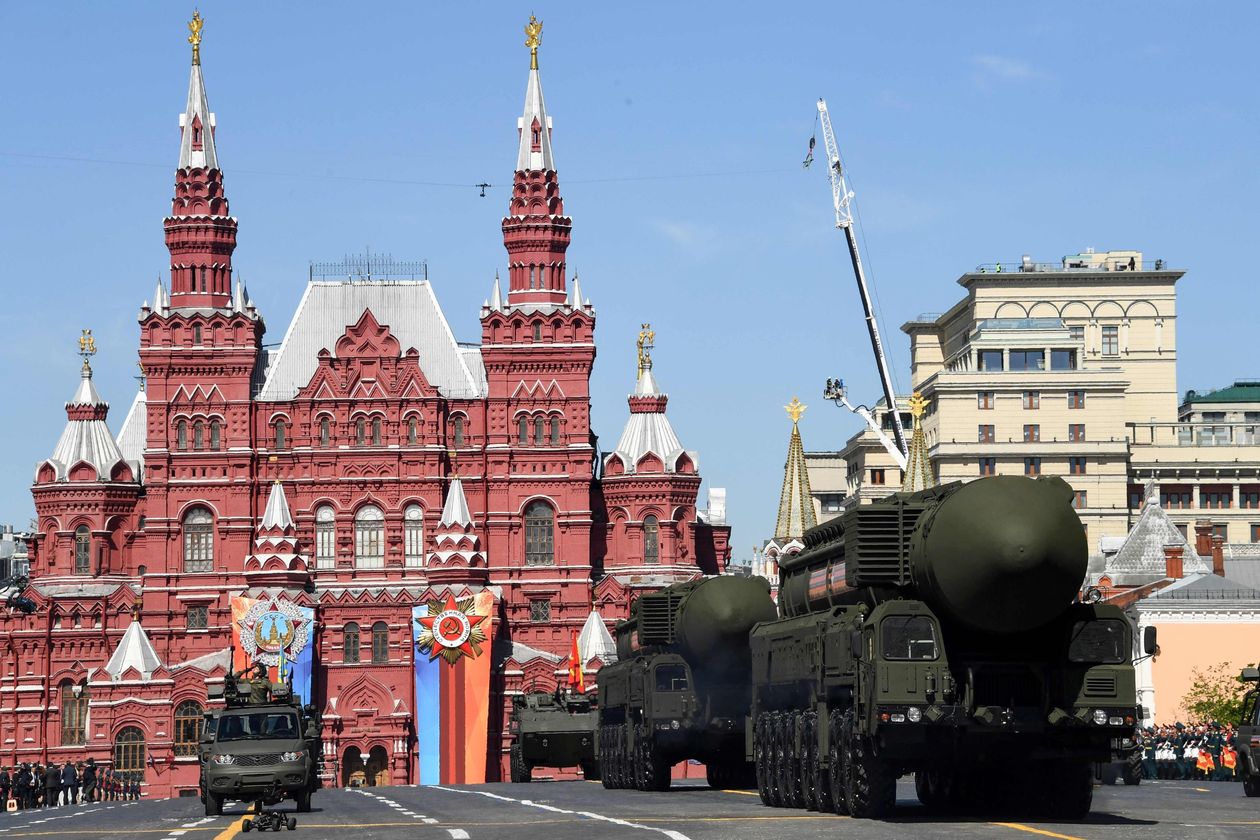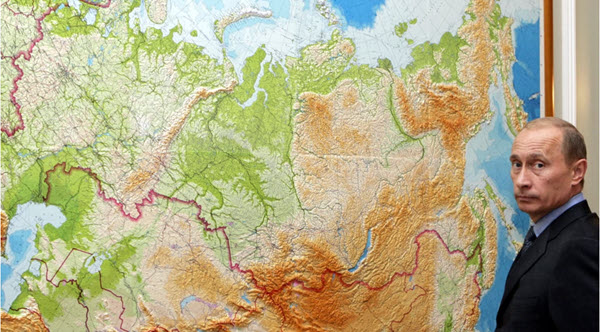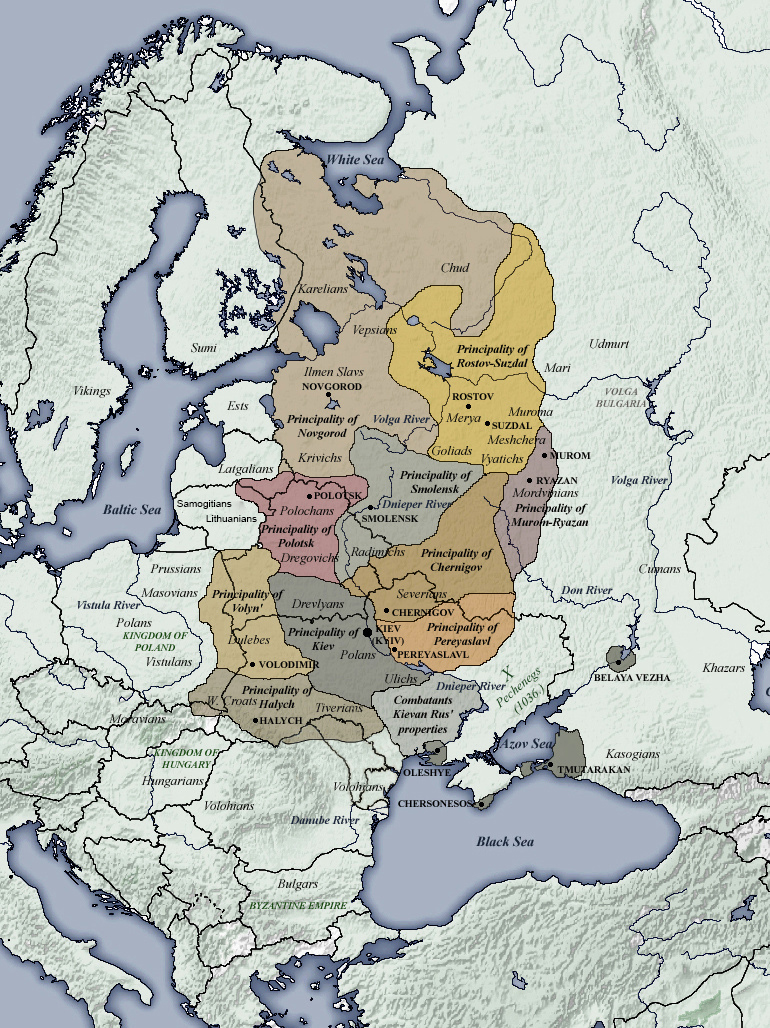The West Needs Constant Reminding, Putin Won’t Stop at Ukraine
Jul 11 2022At the Group of Seven summit in Germany at the year's midpoint, leaders of the world's richest countries pledged to stand behind Ukraine "as long as it takes".
Nevertheless, there is growing unease that as time passes the NATO nations' dedication will begin to wane, that the cost of the constant 
Kremlin on May 9th, Victory Day
supply of armaments will be viewed as onerous, and that Russia's slowly grinding war of attrition will ultimately succeed.
Which makes it imperative that we realize that Vladimir Putin's mindset goes well beyond carving away a chunk of southern Ukraine, that the West cannot afford to drop its guard. Stepping away for the moment from our preoccupation with the January 6 hearings and the Supreme Court's reshaping of this nation, here's a refresher of Putin's grand design: THE WESTERN EXPERIMENT An April article by a Russian journalist who also chairs a council on foreign and defense policy made the clearest statement we've encountered about Russia's divorcing itself from its "obsession" with the West. In the fifteen years after the dissolution of the Soviet Union, writes Fyodor Lukyanov, Russia's conforming to the international order created by the western powers, an inclusion that required meeting the West's criteria but without participation in determining those criteria, proved to be an "experiment" with a "negative" outcome. In its efforts to integrate, Putin had even spoken with Bill Clinton in 2000 about the Russian Federation joining NATO — which had added three countries in the previous year — but the lack of response "left a mark on the Russian political consciousness." Not welcome in the club. There was the question among Russians, though, whether they would always aspire to great nation status and would chafe under the dominance of the sole hegemon at the time, the United States.
Vladimir Putin signaled this disaffection in a speech in Munich in 2007 complaining that a “unipolar world” had been imposed after the Cold War with…
“one center of authority, one center of force, one center of decision-making…one state and, of course, first and foremost the United States, has overstepped its national borders in every way”.
NATO expansion — seven more countries in Central and Eastern Europe had been admitted three years before while George W. Bush was president — was “a serious provocation that reduces everyone’s trust.”
More remarkable was the blistering speech this February in which Putin renounced a century of Russia's leaders, blaming Lenin for "detaching Ukraine from Russia", and Stalin for perpetuating this purported travesty. They are to blame for "modern-day Ukraine being in full and in whole entirely created by Russia…by Bolshevik, Communist Russia". The history from Lenin to Gorbachev was made of "vile, utopian fantasies, inspired by the revolution, but absolutely destructive for a normal country".
Lukyanov says the so-called special military operation against Ukraine has cancelled thirty years of development since the dissolution of the Soviet Union. “He has undone on a coin-flip the achievements of his presidency,” said Alexander Gabuev, a Carnegie Moscow senior fellow. Ending the "conveniences" that development gave to Russia and its consumers returns the nation to the same crossroads it faced at that moment beginning in 1990 when it was "carried away" down the western-centric road where life's purpose was just to make money, the capitalist way. Lukyanov writes:
"The present Russian leadership is determined to correct that mistake…Moscow has made a very big bet. Russia can successfully get out of this predicament only if the current crisis really puts an end to the previous world order. In other words, this means that instead of pushing Russia out of the system, the system itself must cease to exist so that a new one could begin to form on entirely new conditions, different from those of the previous three decades…By abolishing globalization for itself, Russia is making a crucial contribution to its abolition for all."
Furthermore, in place of the "everlasting peace" and the "end of history" the world had come to believe in, Lukyanov writes that Russia is bringing back the old method of solving problems when other methods fail: "classical military conflict". The West is to blame for the…
"stubborn unwillingness of the liberal order leaders to give up the privileges they gained after the Cold War… And there is no going back either for Russia or for anyone else."
As for whether Ukraine is only Putin's first move, if he cannot reconstruct the Soviet Union, with former countries wielding their membership in NATO as deterrent, there is the goal of reuniting the Russian speaking people. Condoleezza Rice, the former secretary of state, met several times with Mr. Putin during the younger Bush's administration:
. “He was always obsessed with the 25 million Russians trapped outside Mother Russia by the breakup of the Soviet Union. Again and again he raised this. That is why, for him, the end of the Soviet empire was the greatest catastrophe of the 20th century.”
Radek Sikorski, a former Polish foreign minister, has a sardonic take on the Putin obsession:
"But remember, Russia never invades. It just comes to the assistance of endangered Russian-speaking minorities.”
That was the original excuse for the little green men infiltrating the Donbas region of East Ukraine. Putin has in his sights the Russian speaking people in the band of countries from Moldova in the 
south bordering on Ukraine, up through Belarus, and in the Baltic states in the north. One-third of Estonia speaks Russian, views Russian television, and takes its side against Ukraine. “Russia now extends however far its leader decides", says Yale historian Timothy Snyder.GREAT RUS
Putin's plunge into Russian history tells him Ukraine cannot be separate because in lore Kyiv was Ur Russia's wellspring city. Moscow came later. He wrote a 5,000 word essay, “The Historical Unity of Russians and Ukrainians”, while isolating to prevent Covid. His arguments went back to the ninth century. His historical immersion is not all that recent. 
The Kyivan Rus 1054 to 1132. Map by SeikoEn, from Wikipedia
In 2013, Putin went to Kyiv to commemorate the 1,025th anniversary of the conversion to Christianity of Prince Vladimir of the Kyivan Rus, calling it “our common Fatherland, Great Rus.” He now says Ukraine is home to “radicals and neo-Nazis” intent on erasing Russia from its culture.
He is perceived to have adopted a civilizational view of where Russia fits in the world, with emphasis on the Russian Orthodox Christianity that precludes any future that embraces the West's same-sex marriage, homosexuality, gender transition, etc., which he views as "decadence." As François Hollande, the former French president, said,
“We did not realize that Putin had spun himself into a historical mythology and was thinking in categories of a 1,000-year empire. You cannot deter someone like that with sanctions.”
His grand design for building a Russian superpower is thought to be a turn to the East, following an intellectual concept that dates from a century ago of creating a Eurasian empire, trading on a deep history of contacts with people of Turkic, Slavic, Mongol and other Asian origins, an empire based on soil and culture. It called for Russia to rid itself of the infatuation with Europe and to emulate the legacy of Genghis Khan to create a continent-wide Russian-Eurasian state.
Its current proponent is Aleksandr Dugin, a philosopher and mystic who stirs nationalist ambitions by reminding that Russia had always been an empire, that Russians are an "imperial people". Dugin is sometimes spoken of as "Putin's Rasputin". As a beginning he has argued that Belarus and Ukraine must become no more than administrative sectors of the Russian state, that military control of the whole north coast of the Black Sea was an “absolute imperative”.
THE CIVILIZATION-STATEPutin's longings for a Eurasian empire seem to be of a piece with a growing "civilizational" movement among eastern nations such as India and China. Their emphasis is away from the nation-state, governed by political ideology, and toward a state organized around a people's history and culture. Bruno Maçães, Portugal’s secretary of state for European affairs from 2013 to 2015, now a senior fellow at the Hudson Institute, a conservative think tank, is often referred to for having written extensively about this doctrine.
Since World War II, the West, and in particular the United States, sought to infuse its values of human rights and democracy worldwide, for many of those years to counter the Russian efforts to spread communism. American political scientist Samuel Huntington put it bluntly in his book “The Clash of Civilizations” that “the concept of a universal civilization helps justify Western cultural dominance of other societies and the need for those societies to ape Western practices and institutions.”
This is a political orthodoxy whereas in contrast, under the civilizational doctrine, the state's paramount task is "protecting a specific cultural tradition", Maçães writes in Noëma Magazine. And this is becoming a core theme of rejecting the West.
He cites Ram Madhav, general secretary of India's ruling Bharatiya Janata Party saying, “From now on, Asia will rule the world, and that changes everything because in Asia, we have civilizations rather than nations.” Just as Putin yearns to unite Russian speakers no matter in what countries they live, India under Prime Minister Narendra Modi "would be tightening ties with the large Indian diaspora in the Americas, Great Britain and the Gulf" and "fast-tracking citizenship for immigrants from Pakistan, Bangladesh and Afghanistan — but not if they are Muslim".
Joking at Chinese inscrutability, Maçães says, after spending time interviewing in Beijing, that "the only moment when a Chinese intellectual or official should be taken literally is when he or she is walking a guest to the car…with no one around". That's when he kept hearing the same message: “Always remember that China is a civilization rather than a nation-state.”
China, India, and Russia under Putin — this appears to be where all are headed as they pull away from the West.
Please subscribe if you haven't, or post a comment below about this article, or
click here to go to our front page.


As a former USAID Officer I worked on the Cross Border Humanitarian Assistance Program for Afghanistan based in Pakistan when the USSR broke up. In the nineties I I was privileged to work several years in the Baltics, Eastern Europe, the five Central Asia Republics and, imagine this, the likes of USAID/Moscow & USAID/Minsk. Now an impossible dream!